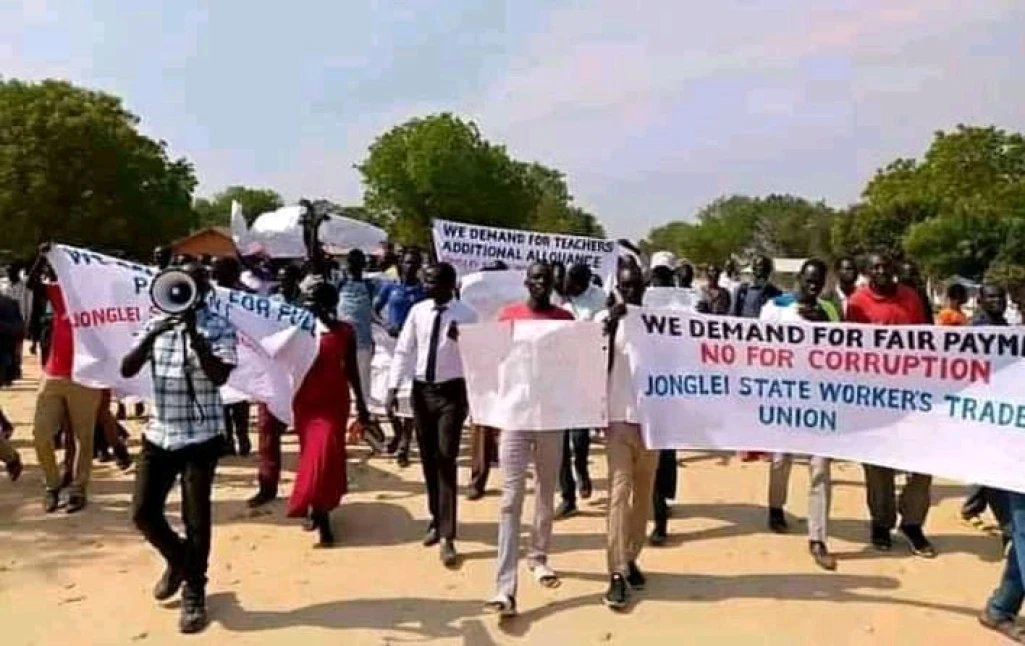
Following the announcement of the oil resumption, citizens have expressed their expectations and concerns, urging the government to end the misappropriation of resources and prioritize the payment of civil servants’ salaries.
Benedict Lokoro, Youth Chairperson of Budi County in Eastern
Equatoria State, voiced frustration over citizens' suffering and the lack of
salaries for teachers, health workers, and organized forces for over a year,
despite the government's capacity to support its people effectively.
“They really need to deal with the issue of citizens
because, even I, as the voice of the youth in my county, am not happy when I’m
doing something and, at the end of the day, I’m not paid. Yet we have national
resources that we can use to pay our civil servants. So, they should prioritize
paying the civil servants,” said Lokoro.
Ohure Charles Omelson, a youth activist, urged the
government to focus on four critical areas which include the payment of civil
servants’ salaries, agriculture, peace and security.
“For the civil servants to perform and provide services to
the people of this country, they need to be given the necessary pay so that
they can support their families and contribute to the country at large, because
the strength of the country lies in its human resources,” Omelson stated.
“If resources are allocated to agriculture, the payment of
civil servants, the peace process, and security arrangements, we will see this
country move forward.”
On Tuesday, the Minister of Petroleum announced the resumption of operations in Blocks 3 and 7 effective January 8, 2025, with a production rate
of 90,000 barrels per day following the lifting of force majeure by the
Sudanese government.
“We can restart oil production, but the key issue is how we
manage it to achieve our goals. We must understand that the oil is not for
individuals, but for the citizens of South Sudan. said Flora Sebit, Executive
Director of the Women Agency for Progress Organization (WAPO).
“We can produce, but in the end, only a small group of
people will benefit, while the majority of South Sudan’s citizens continue to
suffer day and night; this is truly dangerous for us as South Sudanese,” she
added.
Like Flora and many South Sudanese, in 2024, Hon. Achuil
Lual, a national member of parliament, voiced a concern that quickly went
viral. He accused an unnamed individual, referred to as a “rat,” of benefiting
from the country’s oil money, while ordinary citizens suffer from hunger,
disease, and armed robberies along highways -crimes allegedly committed by
government employees who have not been paid.
The remark triggered widespread speculation about the
potential misappropriation of oil resources. However, when asked about the
issue during a press briefing on the resumption of oil exportation, the
Minister of Petroleum Puot Kang denied any knowledge about the “rat”, distancing his
department from the accusation.
“I’m not given responsibility for taking care of rats. But
my responsibility is to make sure we produce barrels. The barrels are marketed.
Once sold, the money does not come to the Ministry of Petroleum,” Kang said.
Peace advocate Christine Namana, from the Justice and Peace
Commission of the Catholic Diocese of Torit, urged the government to use oil
revenues for the greater good of South Sudanese citizens, particularly in
developing lifeline highways that connect to neighboring countries for food
imports and tax collection.
“The roads from which the government gets income to improve
the economic crisis on the side of high inflation of the dollar, buying food
items in the market will be reduced,” Namana said.
“If the government
can use the oil to pay the salaries of civil servants, insecurity along
highways will reduce. There is insecurity on the roads because most of the
government workers are not being paid.”
Civil servants and organized forces in South Sudan have gone
without pay for more than a year, a situation many citizens have labeled a
“national disaster.”
South Sudan's oil exports were suspended on February 6, 2024, due to the ongoing conflict in Sudan, and on March 16, 2024, a force majeure was declared after operators of the Jabelyn-Port Sudan Pipeline found gelling between pump stations 4 and 5, which are in a military operation zone.